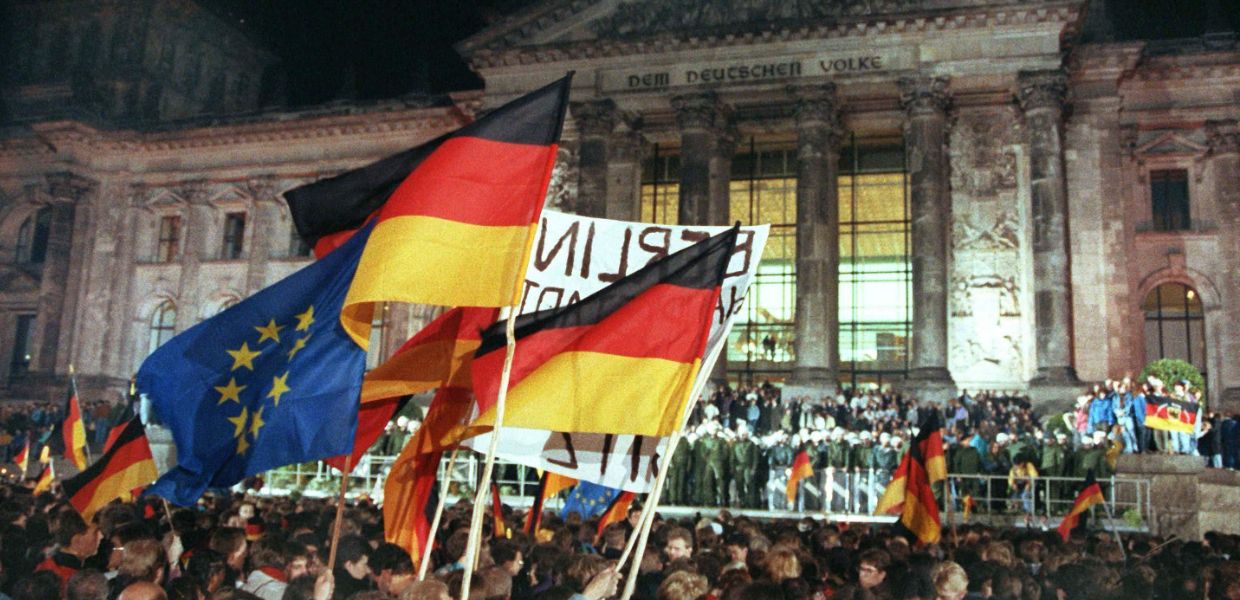European Parliament Archives to curate 20 original exhibitions over four years in 24 languages
Following the success of the ‘70th anniversary of the Schuman Declaration, 9 May 1950’ exhibition, launched in May 2020 by Europeana and the European Parliament Archives, we are pleased to announce a partnership which will see the Archives unit curate around 20 exhibitions over the next four years for publication on the Europeana website.

- Title:
- People celebrating German Reunification in front of the Reichstag (In Copyright)
- Creator:
- Council of the EU
- Date:
- 1990
- Institution:
- European Union
Each exhibition will be published in 24 languages and accompanied by a short educational video subtitled in 24 languages that will be shared on social media.
Addressing themes of democracy, peace and solidarity, the exhibitions will be produced in close collaboration with several departments of the European Parliament. Support will also come from the Newshound - the European Parliament’s monthly staff magazine.
As the partnership progresses, the Europeana Foundation will work with European Parliament Archives staff to allow them to work directly with the content management system to build the exhibitions themselves. This is part of ongoing work to help institutions to build their capacity and empower them with new digital skills.
Douglas McCarthy, Europeana’s Collections Engagement Manager, says, ‘We're enormously pleased that the European Parliament Archives has chosen Europeana to support its extensive 2020-2024 exhibitions programme. Combining modern social and political history with extensive multilingual provision, these exhibitions promise engaging new experiences for Europeana's audiences.’
Ludovic Delepine, Head of the European Parliament Archives Unit, says, 'COVID-19 cases continue to rise in many EU Member States and national authorities are taking further measures to limit the spread of the virus. In this context, it's ever more important to embrace digital. The first partnership to deliver a digital exhibition with Europeana was a successful experience. Now we are working to make it "business as usual". With digital in mind, we have looked at the content in our exhibitions and are now including not just iconographic assets but also archive documents. We are looking for the right balance between images and texts and we look forward to finding out what our audience thinks of the new exhibition.'
It was 30 years ago
The second of this new programme of exhibitions is now online. ‘It was 30 years ago’ explores the European Parliament, the fall of the Berlin Wall and German reunification.
In the night from 9 to 10 November 1989, with absolutely no warning, the Berlin Wall opened at the same time as the communist government of the German Democratic Republic (GDR) collapsed. The Cold War was coming to an end and a momentous page was being turned in Europe’s history. A month later, the Brandenburg Gate officially opened, definitively restoring free movement between the two Germanies. On 3 October 1990, German unification was achieved, effectively transforming the future of European integration.
Despite the speed of events, the European Parliament played its role to the full, stepping up its efforts in response to these political developments. For several months, it provided a forum for the European leaders tasked with preparing the reunification of Germany. Concerned with the political, economic and institutional implications of this historic moment for the European Community, the Members of the European Parliament (MEPs) supported German reunification, increasingly calling for democratisation and respect for human rights in Central and Eastern Europe.
This exhibition explores the building and the fall of the Berlin Wall and the European Parliament’s response to it.

